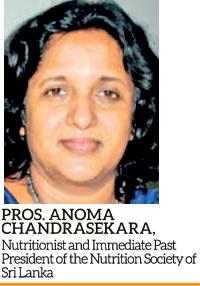Reply To:
Name - Reply Comment

 Many enjoy the thought of going back in time so how about we go back to the Paleolithic era, in terms of food and diet?
Many enjoy the thought of going back in time so how about we go back to the Paleolithic era, in terms of food and diet?
The paleo diet, also known as Paleolithic diet, caveman diet, stone-age diet and hunter-gatherer diet is a dietary plan introduced by Dr. Loren Cordain, a professor from Colorado State University who began his studies during the 1970s.
According to him, the paleo diet shows the ideal way humans are genetically supposed to eat. It is a diet plan based on the primitive food types of our ancestors who used to hunt and gather food for survival. Our genes are apparently not able to catch up with our modern eating habits, thus resulting in an increase of diet and lifestyle related issues such as obesity, diabetes and heart diseases at an alarming rate.
Speaking to the Heath Capsule, Professor Anoma Chandrasekara, Nutritionist and Immediate Past President of the Nutrition Society of Sri Lanka, stated that most people follow the paleo diet in order to reduce risks of the above mentioned lifestyle related diseases and also as a method for weight reduction.
Although the paleo diet is an optimal and healthy choice of eating, it can also bear some risk factors, considering the fact that we are no longer living the life of Neanderthals.
 PROS
PROSProf. Chandrasekara explained that the food included in the paleo diet such as lean meat, poultry fish, shellfish, fresh fruits and vegetables, eggs, nuts and oils from various fruit and nuts (olive oil, coconut oil) are all quite healthy choices with many health benefits. Oils such as olive oil also help improve our lipid profile. Therefore, these food choices will help us to reduce risks of many diseases.
As this diet also requires you to steer clear of processed/artificial foods, it will help avoid the consequences of consuming various unhealthy food additives, preservatives and chemicals.
The paleo diet further restricts the consumption of dairy products, whole grains, all legumes (including peanuts), salt, sugar, vegetable oils and potatoes.
“The food that is avoided by this diet can be contributing factors to many health issues if consumed in unhealthy amounts and therefore, avoiding these types of food can be very beneficial,” Prof. Chandrasekara stated.
There is no such thing as ‘bad food’. What matters is the amount of consumption of certain food types. Complete elimination of some food types can cause serious health issues.
“When we completely avoid whole grain cereals, legumes and dairy, it will lead to certain nutrient deficiencies,” Prof. Chandrasekara explained. “For example, milk and other dairy products are great sources of calcium and proteins. Therefore, halting the intake of these food types will lead to issues such as calcium deficiency, which is a risk factor for osteoporosis, rickets and bone fractures”.
Whole grain cereals and legumes are great sources of Vitamin B. Hence, avoiding them can lead to Vitamin B deficiency thus causing health issues.
“Sometimes, the paleo diet may be a good startup for weight reduction. However, one will not be able to stay committed to the diet plan for a long period of time. Because when there are too many restrictions on one or more food categories, it will be quite challenging to maintain the diet. Therefore, a balanced diet should be the main focus. When following the paleo diet, it is best to also include a few whole grain cereals, legumes and low-fat/non-fat dairy products,” Prof. Chandrasekara advised.
Prof. Chandrasekara further stated that following a such a diet, over time it could increase total and LDL cholesterol levels, thus creating risks for heart diseases.
“All food sources are not available in all parts of our country at affordable prices. Therefore, it may be difficult to maintain such a diet in Sri Lanka. When travelling to different environments - various festivities, celebrations and reunions, we have to face certain types of food and we will not be able ‘make a choice’. We eat not only to obtain nutrients and that’s part of our culture,” Prof. Chandrasekara commented.
“It is also quite important to gain supervision from a nutritionist or dietician when starting diet plans,” she concluded.